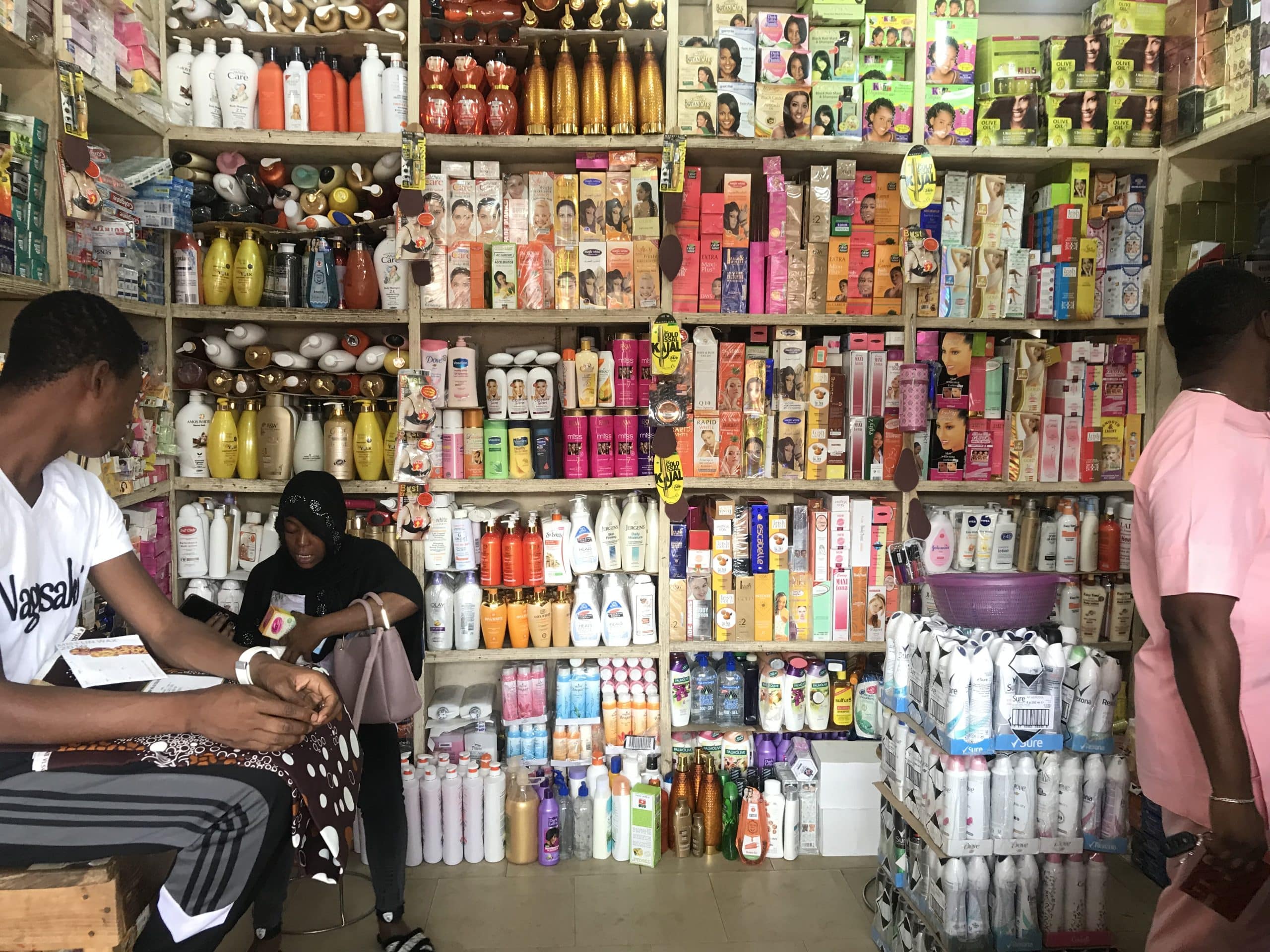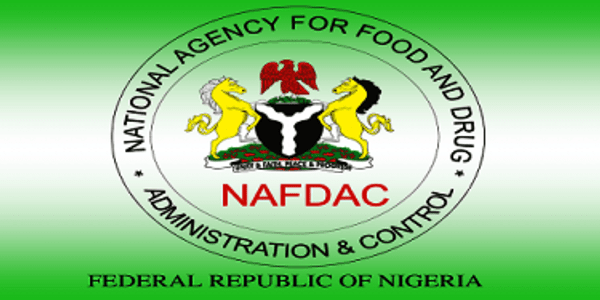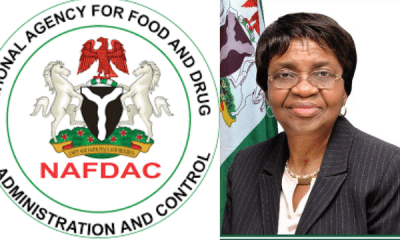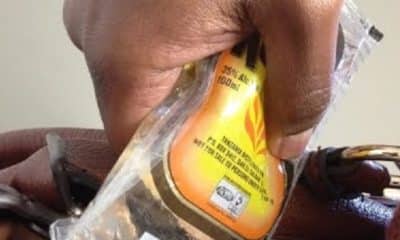Nigeria News
Experts Caution Mothers On Hazards Related To Skin Bleaching In Children

The endless quest for sleek and beautiful skin knows no boundaries, as most Nigerian mothers have taken to skin whitening or bleaching to find beauty for themselves and their children.
There is a myth in Nigeria that lighter-skinned women are considered more beautiful than their dark-skinned counterparts. For this category of people who want to compete with their light-skinned fellows, bleaching is their only best bet.
In recent times, mothers have gradually extended the act to their children. To most mother involved in this act, whitening their children’s skin is an act to maintain their completion.
Naija News gathered from observations that some mothers at major cosmetic stores in Ikotun and Mushin markets in Lagos State searched endlessly for types of creams that have earlier worked for either them or their children to make their skins evenly toned and not bleach them.
While visiting both markets, our reporter observed that mothers trooped to major cosmetics shops to search for whitening creams they use for their children at home.
At a cosmetic shop in Mushin market, a mother brought two empty containers of whitening creams, each for her first and second child. She told the shop attendant to give her the exact products, saying each worked perfectly and differently for her children.
Similarly, mothers at the shop visited in Ikotun market also sought various perfect whitening creams that suit their skin or that of their children or child.
Attempts to speak with most of them didn’t yield results, as they refused to answer why they felt using whitening creams for their children was the best way to maintain their skin.
One of the mothers who spoke with our reporter said her child was a little over three, and his complexion had changed from light to dark, stressing that neither she nor her husband was dark in completion, so she decided to find a good and cost-effective whitening cream that could maintain her son’s colour.
Asked why she thinks her son’s skin went dark, she blamed the harsh weather, saying if one is a light-skinned person, they would ‘burn’ to dark-skinned.
However, the shop attendant disclosed that most women who patronise them don’t only find creams for themselves but for their children, and for some years now, some mothers have been more concerned for their children’s skin.
The shop attendant said besides bleaching creams, some people also buy lighting soap for faster and better effects. He said the cost of some popular brands ranged from N2500 for small containers to as much as N10,000 or N15,000.
Naija News also discovered that there were producers of locally made whitening creams sold for cheaper prices at the Mushin market. It was learned that whitening actives were mixed with shear butter and other unknown agents for people who can’t afford the ‘imported’ well-packaged ones.
This category of shear butter mix is sold for as low as N500 in small portions packed in nylons or simple unbranded containers.
The World Health Organization (WHO), in a 2018 report, revealed that Nigeria had the highest prevalence of use of skin bleaching cream in Africa.
According to the WHO study, 77% of Nigerians, mostly women, use whitening creams, followed by Togo at 59%, South Africa at 35% and Senegal at 27%.
Naija News reports that while the facts are clearly stated, most women deny they don’t bleach but rather tone their skin.
Speaking to a Cosmetologist, Miss Tolulope Awodipe, she said most women often use toning and bleaching interchangeably. But in the real sense, most of them whiten their skins, also called bleaching.
According to Awodipe, skin toning is more of a cleansing process and does not attempt to alter the skin’s natural colour. In contrast, skin whitening or bleaching has the sole aim of lightening the skin colour using chemicals.
She explained that in the formulation or composition of whitening creams, whitening actives such as SepiWhite, GigaWhite, Alpha Arbutin, and Kojic Acid are used.
The skin expert said while manufacturers’ direction requires between 0.5% to 5% maximum usage of these whitening actives, most of her colleagues in the industry use above 5%, noting that some even use as high as 20% whitening actives in their compositions of cream.
Awodipe said producers and marketers boast of fast results in days due to the high mixtures of whitening actives in creams, which bleaches the skin instead of the toning cliche.
Explaining how bleaching happens, Awodipe said the whitening actives in very high quantities block the production of melanin, the substance in the human body that produces dark pigment to make the skin, hair and eyes dark.
The expert affirmed that the menace of mothers bleaching their children’s skin has recently become rampant while ignorantly destroying their children’s skin.
Speaking in an interview with Naija News, a Consultant Dermatology and Deputy Head of Clinical Services at the Federal Medical Centre (FMC), Ebute Metta, Lagos State, Dr. Oluwatoyin Akinsiku, said often most mothers bleach the skins of their children because they want them to be beautiful.
She said most people believe being light-skinned is a description of beauty, so while they bleach their skin to meet social standards, they indulge their innocent children in the act.
Akinsiku explained that the beauty most of them think is attached to bleaching their children’s skins is not even there; instead, the act comes with trouble that can sometimes last a lifetime.
The skin doctor expatiated that skin bleaching is a dangerous act that poses more harm in children because their organs are still developing and delicate.
It was gathered that chemicals from whitening actives leach into the person’s bloodstream directly because about 70% of whatever is robbed on the human skin is assimilated through the skin pores directly into one’s bloodstream.
Akinsiku continued, “Skin bleaching is systemic, those children can have adrenaline shut down, and they can come down with kidney problems, hypertension, or even diabetes.
“Such children are also prone to fungal or bacterial infections, and this can happen at any time. As early as three months, some children begin to suffer the effects resulting from the chemical agents in these creams. They can begin to have bruises, and they won’t heal.
“It can cause lifelong diseases like renal infections, diabetes, and hypertension, as I mentioned earlier, and it can even lead to skin cancer in some.”
Explaining how long effects manifest in children, Akinsiku noted that ‘The duration for effects to begin in children is even faster, like three months depending on other conditions the child might be battling with and even the environment and what the child is treated with.
“The effects come in the short term, like rashes, infections, and skin damage, while the long-term effects are some terminal disease that happens later in the life of the children.
“Parents who bleach the skins of their children should stop because the damage is enormous, Even the beauty they are looking for is not even there, instead, it comes with so much trouble for the children.”
NAFDAC Wages War Against Skin Bleaching, Declares National Emergency
Meanwhile, in recent times, the National Agency for Food and Drug Administration and Control (NAFDAC) has waged a war against the usage of skin-bleaching creams in Nigeria.
In Febuary 2023, the agency declared a national health emergency on skin bleaching creams usage in the country.
At a flag-off of a media sensitisation workshop on Dangers of Bleaching Creams and Regulatory Control organised by the Association of Nigerian Health Journalists in Kano State, the Director-General of NAFDAC, Prof. Mojisola Adeyeye, raised the alarm on the menace of bleaching creams in Nigeria.
The NAFDAC boss said, “The World Health Organisation study in 2018 revealed that the use of skin bleaching cream is prevalent amongst 77 per cent of Nigerian women, which is the highest in Africa compared to 59 per cent in Togo, 35 per cent in South Africa and 27 per cent in Senegal.
“These scary statistics have shown that the menace of bleaching creams in Nigeria has become a national health emergency that requires a multi-faceted regulatory approach.”
Adeyeye said the statistic struck the Federal Government that the former Secretary to the Government, Boss Mustapha, had to write her office last year for a solution to the menace.
However, all efforts by this platform to get the reaction of the NAFDAC DG on bleaching in children proved abortive as she wasn’t picking up her calls and has yet to reply to messages sent to her as of the time of filling this report.











